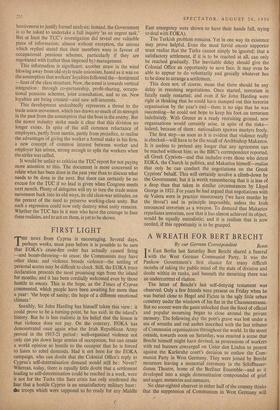FIRST LIGHT
THE news from Cyprus is encouraging. Several days, perhaps weeks, must pass before it is possible to be sure that EOKA's cease-fire order has actually caused firing —and bomb-throwing—to cease; the Communists may have other ideas; and violence breeds violence—the settling of personal scores may be difficult to check. Still, the EOKA truce declaration presents the most promising sign from the island for months; and it has been cordially welcomed even by those hostile to enosis. This is the hope, as the Times of Cyprus commented, which people have been awaiting for more than a year: 'the hope of sanity; the hope of a different emotional climate.'
Sensibly, Sir John Harding has himself taken this view: it could prove to be a turning-point, he has said, in the island's history. But he is less realistic in his belief that the lesson is that violence does not pay. On the contrary, EOKA has demonstrated once again what the Irish Republican Army proved in the 1917-21 period : well-organised violence not only can pin down large armies of occupation, but can create a world opinion so hostile to the occupier that he is forced to listen to rebel demands. Had it not been for the EOKA campaign, who can doubt that the Colonial Office's reply to Cyprus's self-determination demand would still be : Never? Whereas, today, there is equally little doubt that a settlement leading to self-determination could be reached in a week, were it not for the Turks (the Suez crisis has only confirmed the fear that a hostile Cyprus is an unsatisfactory military base : the troops which were supposed to be' ready for any Middle East emergency were shown to have their hands full, trying to deal with EOKA).
The Turkish problem remains. Yet in one way its existence may prove helpful. Even the most fervid enosis supporter must realise that the Turks cannot simply be ignored; that a satisfactory settlement, if it is to be reached at all, can only be reached gradually. The inevitable delay should give the Colonial Office an opportunity to save face. It may even be able to appear to do voluntarily and genially whatever has to be done to arrange a settlement.
This does not, of course, mean that there should be any delay in resuming negotiations. Once started, terrorism is fatally easily restarted; and even if Sir John Harding were right in thinking that he could have stamped out this terrorist organisation by the year's end—there is no sign that he was succeeding—he could not hope to keep his foot on terrorism indefinitely. With Greece as a ready recruiting ground, new organisations would certainly arise, in spite of the risks— indeed, because of them : nationalism spawns martyrs freely.
The first step—as soon as it is evident that violence really is checked—will have to be the recall of Archbishop Makarios. It is useless to pretend any longer that any agreement can be reached without him; as the BBC's correspondent reported, all Greek Cypriots—and that includes even those who detest EOKA, the Church in politics, and Makarios himself—realise that only he can conduct the negotiations on the Greek Cypriots' behalf. This will certainly involve a climb-down by the Government; but it is worth remembering that it is less of a drop than that taken in similar circumstances by Lloyd George in 1921. For years he had argued that negotiations with de Valera were in practice unnecessary ('we have murder by the throat') and in principle impossible, unless the Irish renounced terrorism as a weapon. To demand that Makarios repudiates terrorism, now that it has almost achieved its object, would be equally unrealistic; and it is realism that is now needed, if this opportunity is to be grasped.


























 Previous page
Previous page